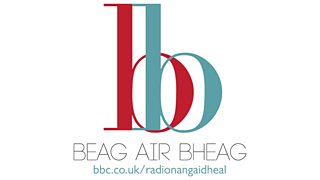Oisean a’ Ghrà mair Sreath 11: 1
CRIOMAG 1: Mòrag Stiùbhart agus Iain Mac'illeMhìcheil (Sealladh Eile)

1. CHAIDH MO/DO/A, ... : ‘I / YOU / HE / SHE got somethinged, were somethinged’
(Passive construction)
Mòrag: “Bhiodh mo mhàthair ag innse dhomh mar a chaidh a toirt dhan ospadal ann an Loch nam Madadh ann an cùl bhan.”
“My mother used to tell me how she got taken to the hospital in Lochmaddy in the back of a van.”
‘My mother got taken to hospital’: Chaidh mo mhàthair a thoirt dhan ospadal.
‘The children will get taken to hospital’: Thèid a’ chlann a thoirt dhan ospadal.
Chaidh ... a thoirt (‘went to taking’)
Ach
‘She got taken to hospital’: Chaidh a toirt dhan ospadal. (‘her taking’)
‘They’ll get taken to hospital’: Thèid an toirt dhan ospadal. (‘their taking’)
‘I was taken, You got taken, He/She got taken’, etc: MO, DO, A, etc.
‘My family was raised up in this village’: Chaidh mo theaghlach a thogail sa bhaile seo.
ACH
‘I was raised up in this village’: Chaidh mo thogail sa bhaile bheag seo. (‘my raising’)
I got taken away: Chaidh mo thoirt air falbh (mo thoirt - ‘my taking’)
You got taken away: Chaidh do thoirt air falbh (do thoirt - ‘your taking’)
He / She got taken away: Chaidh a thoirt / a toirt air falbh. (a thoirt - ‘his taking’) (a toirt - ‘her taking’)
We got taken away: Chaidh ar toirt air falbh. (ar toirt - ‘our taking’)
You (plural) got taken away: Chaidh ur toirt air falbh. (ur toirt - ‘your taking’)
They got taken away: Chaidh an toirt air falbh. (an toirt - ‘their taking’)
‘It got done.’ Chaidh a dhèanamh. (‘its doing’)
‘She was sent home.’ Chaidh a cur dhachaigh. (‘her sending’)
‘We all got hit.’ Chaidh ar bualadh uile. (‘our hitting’)
‘You’ll be protected.’ Thèid ur dìonadh.
2. IT’S A ... : THA E NA (‘in its’) ...
Iain: “’S cha robh fuachd na dhragh sam bith aig an àm?”
“And cold wasn’t a problem at all at the time?”
‘something is a something’: ‘something is in its something’.
‘Cold wasn’t a problem.’ Cha robh fuachd na dhragh. (‘in its problem’)
‘I was a boy at the time.’ Bha mi nam bhalach aig an àm. (‘in my boy’)
‘You’re a parent now.’ Tha thu na do phàrant a-nise. (‘in your parent’)
Iolra (Plural):
‘We’re all parents here.’ Tha sinn uile nar pàrantan an seo. (‘in our parents’)
‘You’re not members of the team.’ Chan eil sibh nur buill den sgioba.
‘They were students.’ Bha iad nan oileanaich.
3. FH (gun fhuaim | soundless)
[Practice in recognising words with lenited (silent) f.]
CRIOMAG 2: Dòmhnall Moireasdan (Aithris na Maidne)
“Highland Laddie – an dearbh fhonn a bha pìobaire a’ cluiche an latha ud nuair a chaidh iad air tìr aig Arromanches.
“Highland Laddie - the very same tune that a piper was playing that day when they landed at Aromanches.”
“Chaidh còrr air ciad gu leth mìle de dh’fheachdan a’ chaidreachais an sàs air D-Day.”
“More than 150 000 of the allied forces took part in D-Day.”
“A’ Bheilg, Nirribhidh, a’ Phòlainn, a’ Ghrèig, Lucsamburg, Astràlia, New Zealand agus an Fhraing nam measg.”
“Belgium, Norway, Poland, Greece, Luxemburg, Australia, New Zealand and France among them.”
dearbh (‘very same’) - deagh (‘good’) - droch (‘bad’) - glè (‘very’) + sèimheachadh
do (‘to’) - de (‘of’) + dh’ + sèimheachadh
feminine nouns (ainmearan boireann)
deagh (fh)reagairt - ‘a good answer’
an dearbh (fh)ireannach - ‘the very man’
droch (fh)aireachdainn - ‘a bad feeling’
glè (fh)uar - ‘very cold’
na mìltean de dh’(fh)eachdan - ‘thousands of troops’
an (fh)ìrinn (the truth) - an (fh)eòil (‘the meat’) - an (Fh)raing (‘France’)

